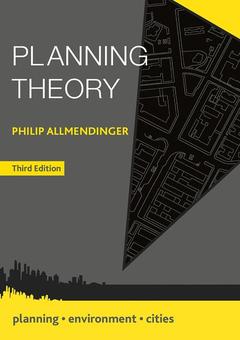Planning Theory (3rd Ed., 3rd ed. 2017) Planning, Environment, Cities Series
Auteur : Allmendinger Philip

In the 3rd edition of the leading introductory textbook to planning theory, Allmendinger provides a wide-ranging and up-to-date analysis of planning theories, how these relate to planning practice, and their significance. Moving away from a linear, chronological model of progress over time from one paradigm to another, Allmendinger explains how and why different theories have gained dominance in particular places at particular times, giving the reader a holistic view of the field of scholarship and to demonstrate the relevance of planning theory for practise.
Planning theory has undergone significant changes in recent decades as new theories and perspectives have emerged. Allmendigner takes care to detail the historical evolution of planning theory and the key philosophical issues involved so as enable the reader to both understand and critique theories as they encounter them.
This much revised edition of Philip Allmendinger's text draws upon both established theories and expands its scope of current thinking around neoliberalism, post-colonialism and post-structuralist thinking on politics, space and scale.This unique approach to planning theory means this is an essential for all students completing planning theory courses in Urban or Planning studies, at both undergraduate and postgraduate level.
1. What is Theory?.- 2. The Current Landscape of Planning Theory.- 3. Systems and Rational Theories of Planning.- 4. Critical Theory and Marxism.- 5. Neoliberal Planning.- 6. Pragmatism.- 7. Planners as Advocates.- 8. After Modernity.- 9. Planning, Depoliticisation and the Post-political.- 10. Post-Structuralism and New Planning Spaces.- 11. Collaborative Planning.- 12. Planning, Postcolonialism, Insurgency and Informality.- 13. Conclusions
PHILIP ALLMENDINGER is Professor of Land Economy, University of Cambridge, UK.
- Accessibly written for both undergraduate and postgraduate students
- Provides a wide-ranging analysis of planning theory
- Broad international scope of coverage of theories and practice examples
new_to_this_edition
- Comprehensively revised and updated throughout
- Greater international scope of coverage of theories and practice examples
- Reflects the shift in planning theory to post-structuralism
Date de parution : 07-2017
Ouvrage de 346 p.
14.8x21 cm
Retiré de la vente
Date de parution : 06-2017
Ouvrage de 346 p.
14.8x21 cm
Retiré de la vente
Thème de Planning Theory :
Mots-clés :
geography; planning; planning theory; urban planning; theory


